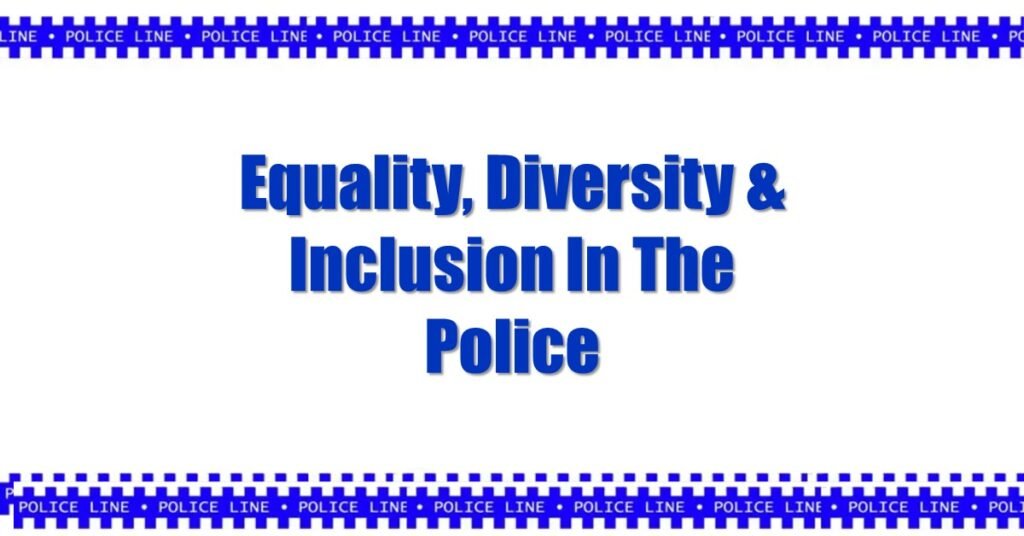Diversity and inclusion in the police force is an increasingly important issue that needs to be addressed. As a society, we are constantly evolving, and our law enforcement agencies need to grow with us. The UK’s police force has taken steps toward promoting diversity and inclusion, but there is still much work to be done. In this article, we will explore how the police in the UK approach issues of diversity and inclusion.
In today’s globalised world, it is essential for all public institutions—from schools to government departments—to prioritise offering equal opportunities. This goes beyond race and gender but now needs to ensure broader inclusion looking at including the alternatively abled.

By striving for greater diversity within their ranks, they can better serve as representatives of their communities and foster trust between citizens and authorities.
Despite recent efforts made by British police forces to promote diversity within their own walls, there can still be significant obstacles on both sides when it comes to creating a truly inclusive environment where everyone feels accepted and respected.
How do these organisations handle such challenges?
Let’s take a closer look at what measures have been introduced so far, including initiatives designed specifically to increase minority representation among officers while fostering respect amongst them all.
Overview Of Uk Police Force And Diversity
When it comes to the UK police force, diversity and inclusion are at the forefront of their mission.
As a nation that prides itself in its rich history and cultural heritage, they have placed a strong emphasis on making sure all members of their community feel welcome and respected.
From supporting underrepresented groups such as BAME communities and LGBTIAQ+ individuals, to implementing measures to ensure fair recruitment practices, they strive to make sure everyone gets an equal chance within their organization.
The UK police have also taken steps towards creating a more inclusive environment for those who work within this profession.
This includes launching initiatives like ‘Women in Policing’ which is designed to encourage gender equality across the force by providing mentoring opportunities for female officers.
They have also developed programs such as The Police Race Action Plan which helps promote understanding between different cultures and bridge any gaps in knowledge or experience levels between officers from different backgrounds.
The UK police forces remain committed to upholding these principles so that every member of society can enjoy equal protection under the law regardless of race, religion, disability or sexual orientation.
Through promoting greater awareness amongst staff about issues relating to diversity and accepting feedback from stakeholders regarding areas where improvement could be made, they are constantly striving to further strengthen their commitment to achieving true inclusion throughout the organisation.
Challenges Of Diversity And Inclusion In The Uk Police Force
As the UK police force continues to prioritise diversity and inclusion, there are a number of challenges that come with it.
For example, recruiting a diverse workforce often proves difficult due to certain barriers that can exist in terms of entry requirements or pre-existing biases.
Additionally, many officers may not be adequately prepared for the unique issues and needs of the different communities they serve.
This can create an environment where people from minority backgrounds feel unwelcome or disrespected by law enforcement which is damaging both to their trust in the police as well as community relations.
In order to address these problems, several initiatives have been set up within the police service.
These include programs such as cultural awareness training, mentoring schemes and positive action recruitment drives aimed at increasing the representation of minority groups.
Moreover, more emphasis has been placed on building relationships between police officers and local communities through activities like neighbourhood watch meetings, Independent Advisory Groups, and consultations on crime prevention strategies.
Creating spaces where everyone feels welcomed and respected, allows members of all backgrounds to work together towards safer neighbourhoods while also fostering mutual understanding between citizens and authorities alike.
Strategies To Promote Diversity And Inclusion In The Uk Police Force
First off, recruitment practices have been updated to make sure a more diverse range of candidates is considered for positions within the police force.
This includes ensuring all job postings include language that makes clear no form of discrimination will be tolerated.
Additionally, many forces now offer training initiatives so existing officers understand how to effectively work with people from different backgrounds or cultures.
In order to further encourage an inclusive culture throughout the UK police force, efforts are also being taken to create safe spaces where anyone can voice their opinions and concerns without fear of judgement or reprisal.
There are also programmes in place that aim to educate both staff members and members of the public on issues related to unconscious bias and cultural awareness. Such initiatives provide invaluable knowledge that helps everyone involved better recognise signs of inequality and take steps towards creating positive change within the organisation.
These measures are helping drive progress within the UK police force when it comes to promoting diversity and inclusion – making our communities safer places for all who live there. Through continued commitment from leadership as well as ongoing education across teams, we can continue working towards a future where fairer representation is achieved throughout every level of law enforcement
Implications Of Diversity And Inclusion In The Uk Police Force
The importance of promoting diversity and inclusion within the police force goes beyond just creating a more diverse workforce; it also enables officers to better understand their communities, build trust with members of different cultures, and serve as effective agents of change.
The following bullet points will explore some key implications of encouraging diversity and inclusion in the UK police force:
• Improved Community Relations:
○ Diversity among officers helps bridge cultural gaps between law enforcement personnel and community members from different backgrounds.
○ Greater understanding leads to improved relations between law enforcement and minority groups that may historically distrust the police.
• Better Performance Outcomes:
○ A greater array of perspectives strengthens problem-solving capabilities when dealing with complex issues such as crime prevention or responding to emergencies.
○ Increased accountability encourages officers to make decisions based on fairness instead of bias or prejudice.
As we can see, there is no denying the positive impact that diversity and inclusion can have on both citizens’ interactions with law enforcement personnel as well as their overall safety outcomes.
By fostering an inclusive atmosphere within its ranks through recruitment policies, training initiatives, data collection processes etc., the UK police force has taken strides towards breaking down barriers while simultaneously building bridges towards a brighter future for everyone involved.
Final Thoughts
In conclusion, the UK police force is facing many challenges when it comes to promoting equality, diversity and inclusion. Although there have been some positive steps taken in recent years, more needs to be done in order for meaningful progress to occur. It’s essential that these efforts are evaluated regularly in order to ensure their effectiveness and identify areas of improvement. Ultimately, this will help create an environment where people from all walks of life feel comfortable engaging with law enforcement officers and helping them do their job better. With continued dedication and commitment, we can make sure everyone feels included as part of the community served by the UK police force.
What are your thoughts, what more could the police be doing to ensure equality, diversity and inclusion?




